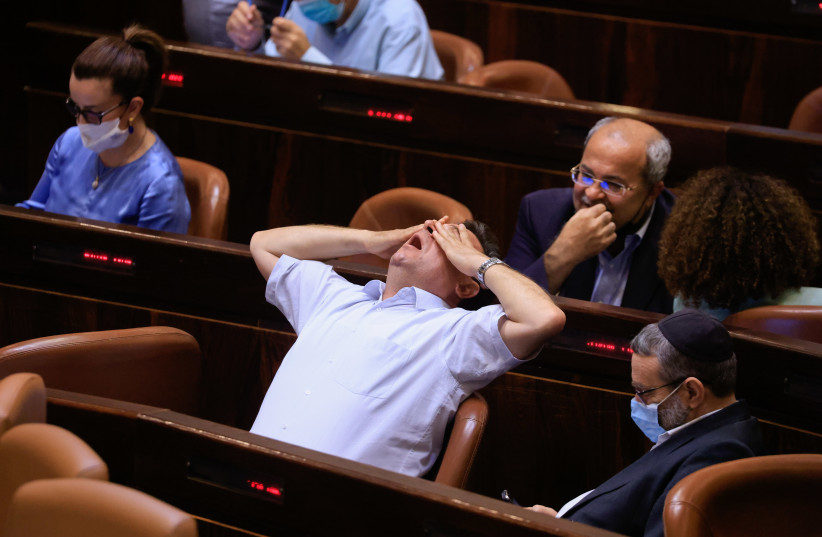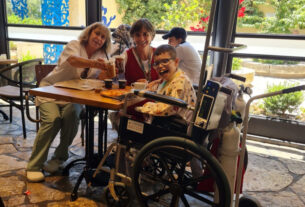Half the country was upset by the result of last week’s Knesset election and some may have even lost sleep over it. Researchers at Beth Israel Deaconess Medical Center (BIDMC) in Boston who conducted just-publicized research on the US elections in 2020 found that such political events can have dramatic global impacts on psychological health and impact sleep and emotional well-being.
While conventional wisdom suggests highly anticipated events, such as elections, can cause stress and disrupt well-being, little research has been published exploring this relationship.
“It is not just that elections may influence sleep, but evidence suggests that sleep may influence civic engagement and participation in elections as well.”
Dr. Tony Cunningham, director of BIDMC’s Center for Sleep and Cognition
The study, published in the journal Sleep Health under the title “New research suggests political events impact sleep,” holds some relevant new ideas for Israelis, who voted five times in Knesset elections in less than four years.
The findings – according to the study’s corresponding author Dr. Tony Cunningham, director of BIDMC’s Center for Sleep and Cognition – show that divisive political events negatively influenced a wide variety of factors related to public mood.
Psychological effects of COVID-19
“It is unlikely that these findings will come as shock to many given the political turbulence of the last several years. Our results likely mirror many of our own experiences surrounding highly stressful events, and we felt this was an opportunity to scientifically validate these assumptions,” he said.
As part of a larger study exploring the psychological repercussions and effects on sleep of the COVID-19 pandemic, the team surveyed 437 participants in the US and 106 international participants daily in 2020 between October 1 and 13 (before the election) and then again between October 30 and November 12 (days surrounding the November 3 US election of Donald Trump).
Participants reported on their duration and quality of sleep, alcohol consumption and subjective experience of overall stress. Their responses revealed reduced sleep quantity and efficiency coupled with heightened stress, negative mood and alcohol use in the period surrounding the election. While these results were observed at a lower level in non-US participants, worsening health habits were significantly correlated with mood and stress only among Americans.
The daily surveys – delivered to the researchers each morning at 8 a.m. local time – asked respondents to assess the previous night’s sleep by recording their bedtimes, time required to fall asleep, number of awakenings through the night, morning wake time and time spent napping during the day, as well as the previous night’s alcohol consumption. Mood was assessed using a validated questionnaire as well as questions from a standard depression screening tool.
With regard to sleep, both American and non-US participants reported losing sleep in the run-up to the election; however, US respondents spent significantly less time sleeping in the days around the election.
On election night itself, Americans reported waking up frequently during the night and experiencing poorer sleep efficiency. Those who consume alcohol reported that their intake significantly increased during the assessment period. Among non-US participants, there was no change in alcohol consumption over the November assessment period.
When the scientists looked at how these changes in behavior may have affected the mood and well-being of Americans, they found significant links between sleep and drinking, stress, negative mood and depression.
Sharp rise of stress found before elections
Analysis revealed that stress levels were largely consistent for both US and non-US participants in the assessment period in early October, but there was a sharp rise in reported stress for both groups in the days leading up to the November 3 election. Stress levels dropped dramatically once the election results were officially announced on November 7.
This pattern held for both Americans and those abroad, but changes in stress levels were significantly greater in the Americans, who reported a similar pattern with depression that their non-US counterparts did not experience. However, those outside the US reported significant decreases in negative mood and depression the day after the election was called.
“This is the first study to find that there is a relationship between the previously reported changes in Election Day public mood and sleep the night of the election,” Cunningham said. “Moreover, it is not just that elections may influence sleep, but evidence suggests that sleep may influence civic engagement and participation in elections as well, so if the relationship between sleep and elections is also bidirectional, it will be important for future research to determine how public mood and stress effects on sleep leading up to an election may affect or even alter its outcome.”




